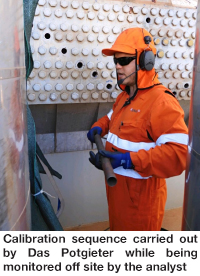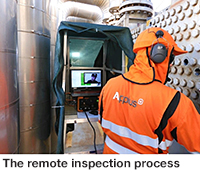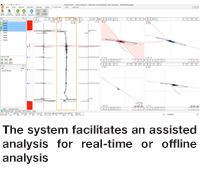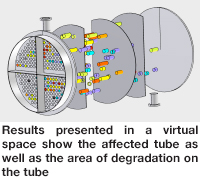Transforming NDT with industrial demands and global transformation requirements
21/09/2020
In an ever-changing inspection environment that demands a specific and efficient reaction to the needs of clients, inspection technologies are required to evolve with that trend. In order to remain customer focused and meet the demands of the changing landscape, Applus+ is developing new and innovative ways to adapt to those changes.Grant Meredith, Technical Manager at Applus+ Australia, explains…
 Applus+ has been providing asset integrity services to a variety of clients since the 1940s and, with continuing expansion and improvements, has gained ground as a result of the confidence achieved from its clients in providing high-quality asset integrity services in a wide range of industries and on a global scale. Having been at the forefront of industry for decades, the company has experienced a multitude of significant global issues affecting the way business has been performed. In responding to these challenges, and with the onset of the global pandemic experienced in COVID-19, a holistic look at business approach was embarked upon.
Applus+ has been providing asset integrity services to a variety of clients since the 1940s and, with continuing expansion and improvements, has gained ground as a result of the confidence achieved from its clients in providing high-quality asset integrity services in a wide range of industries and on a global scale. Having been at the forefront of industry for decades, the company has experienced a multitude of significant global issues affecting the way business has been performed. In responding to these challenges, and with the onset of the global pandemic experienced in COVID-19, a holistic look at business approach was embarked upon.Applus+ has stepped up a gear in developing and accessing advanced technologies in order to meet these new challenges. One of the ways was through an introspective look at the process flow currently employed for delivering a superior product to the customer. With the restrictions on moving personnel regionally and internationally, a significant disruption to that process flow was imminent. It would mean an on-time service delivery without the presence of some key role players at the time of inspection. This was driven by the international lockdown due to the outbreak of COVID-19. In response to this, the company developed a model for performing off-site data processing and analysis. A working model was presented to the client to ensure that all of the objectives could be met. This was accepted as a trial model and, while under their surveillance, the remote monitoring and inspection process began.
 The proposed working model was to have the data acquisition technician in real-time connection with the NDT Level 3 and analyst, while performing the inspection process until completion. Communication was maintained throughout the inspection process. The acquired data was reviewed in real time and was saved and stored in an accessible folder for offline analysis and reporting. Once this was completed, all records were securely archived. This entire process flow was monitored by the customer and quality assurance was maintained to ensure integrity. Any changes proposed or shortcomings experienced could be documented, rectified and implemented immediately. The final model was approved by the customer as a working model for the road ahead and rolled out.
The proposed working model was to have the data acquisition technician in real-time connection with the NDT Level 3 and analyst, while performing the inspection process until completion. Communication was maintained throughout the inspection process. The acquired data was reviewed in real time and was saved and stored in an accessible folder for offline analysis and reporting. Once this was completed, all records were securely archived. This entire process flow was monitored by the customer and quality assurance was maintained to ensure integrity. Any changes proposed or shortcomings experienced could be documented, rectified and implemented immediately. The final model was approved by the customer as a working model for the road ahead and rolled out.Another change process was spawned by the limitations experienced in terms of availability of fully qualified analysis personnel in industry presently. Tube inspection interventions involve the acquisition and analysis of tens of thousands of data points. Each need to be reviewed and sentenced. Tube inspection outages often include the analysis of tens of thousands of tubes required for reporting in very short periods of time. Artificial intelligence (AI), machine learning (ML) and deep learning (DL) capabilities are required to assist in the process.
Currently, Applus+ performs tube inspections on a large scale on a range of assets, including chillers, heaters, coolers, boilers, air coolers and heat exchangers, to name but a few. For the inspection of hundreds of thousands of tubes annually, it relies on the expertise and experience of analysts who are specialists in signal interpretation. Applus+ already provides a high-quality, world-class service for the evaluation of tube bundles and is continually looking at ways of improving the efficiency and effectiveness of its service provision.
Equipment manufacturers, including Applus+ for inspection and testing services, are responding to industry’s challenges by developing robotic and automated inspection equipment to meet the needs of physically demanding inspection zones and safety-critical inspection environments. As software improves, the analysis and reporting on thousands of data points are now also being simplified by ML and the creation of analysis platforms using AI.
 Algorithms for specific, known information about signal responses from known parameters for real defects are created. This is a platform to facilitate that AI process. When considering an algorithm for the purpose of eddy current analysis and evaluation of condenser tubes, general wall loss in a tube produces a distinctly different eddy current signal to that caused by localised pitting. By collecting this information and creating algorithms for signal recognition of the full range of known variables, analysis and evaluation platforms can be created.
Algorithms for specific, known information about signal responses from known parameters for real defects are created. This is a platform to facilitate that AI process. When considering an algorithm for the purpose of eddy current analysis and evaluation of condenser tubes, general wall loss in a tube produces a distinctly different eddy current signal to that caused by localised pitting. By collecting this information and creating algorithms for signal recognition of the full range of known variables, analysis and evaluation platforms can be created.With the consistent, known variables factored into the algorithm, additional variables such as material types and geometrical considerations (tube supports) are added. With ML, the algorithms start to update themselves, removing other variables from the inspection, including scaling and conductivity or permeability variables. The programs update themselves through the consistent and continual addition of data files and thus reduce the amount of human interaction required. This is where DL starts to take effect.
In current industry practice, where there is inspection data in the tens of thousands of acquisition points for extensive tube lengths, as is the case with heat exchanger tube inspections using the eddy current inspection method, the onus is on the highly skilled and experienced analyst to trawl through all of this data one tube at a time in a very short time frame to deliver precise and accurate results for a range of degradation mechanisms. Inevitably, the human element in terms of concentration, fatigue and consistency while performing an analysis is bound to cause issues at some time or another. The inclusion of this process step in the model leaves significantly reduced numbers of tubes with anomalies to be reviewed, with more focus on the ability to critically look at the affected tubes in an inspection intervention. Pressure is removed so that the highly skilled analyst can review only the affected tubes and outliers, while acceptable tubes can be quality reviewed on a percentage basis for accuracy of the algorithm.
To improve the use of the data presented to its customers, along with data storage, retrieval and visualisation of the effects of the results on a particular inspected unit, digital twin models can integrate inspection results analysed using an AI inspection model. This makes it possible to view the inspected unit, providing an overview of affected areas, tubes and zones and allowing engineering determination to perform the function of determining the causality of a failure or extensive degradation of an inspected unit. This allows for repair or exchange as the sentencing requirement dictates. A model of the degradation of tubes can be built up for each inspection type, for a heat exchanger or other company asset, for example, to assist with the assessment of the remaining life and condition of the asset. The added benefit of this is that repeat inspection data can be overlaid or included into baseline or previous inspection data to assess remaining life and degradation rates, an added engineering functionality for the presentation of inspection results.
Reported data can be stored in virtual space, in the digital twin rather than in bulky and cumbersome PDF or paper reporting formats. This allows for live and interactive use of inspection data, constantly and consistently updating and facilitating RBI decisions for possible life extensions or replacements as the service life of the unit dictates.
 NDT inspection methods are limited in that one method cannot detect all degradation types; the same goes for tube inspection technology: multiple techniques need to be used to improve the reported data. This technology allows multiple inspection methodologies to be integrated into one platform for a better overview of the condition of the inspected asset. The results are combined within the software models as confirmation of, or additional data to support, degradation mechanisms. This provides an added benefit when accessing areas where one inspection technique is less sensitive to a particular degradation mechanism, for example internal and external tube degradation or multiple degradation points at one circumferential point along a tube length.
NDT inspection methods are limited in that one method cannot detect all degradation types; the same goes for tube inspection technology: multiple techniques need to be used to improve the reported data. This technology allows multiple inspection methodologies to be integrated into one platform for a better overview of the condition of the inspected asset. The results are combined within the software models as confirmation of, or additional data to support, degradation mechanisms. This provides an added benefit when accessing areas where one inspection technique is less sensitive to a particular degradation mechanism, for example internal and external tube degradation or multiple degradation points at one circumferential point along a tube length.Applus+ strives to continually perform beyond standards and exceed its clients’ expectations. While these changes are presented as an immediate response to dynamic industry needs, the company is constantly developing game-changing processes to remain at the forefront of inspection diversity and efficiency while exceeding customer needs.
www.applus.com/global/en